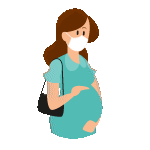An expecting woman will embrace the Monsoon, which may make the entire pregnancy journey delightful. It can appear like an extended vacation to stay in bed with just a warm drink in hand, eat lots of goodies, and watch movies. But during the Monsoon, a woman's diet must follow particular guidelines. When it's raining outside, you might feel comfortable getting a delicious samosa from the corner store, but that isn't the ideal option for your health or the health of your unborn child.
Allergies and Infections are caused by the Monsoon's humid weather and favourable temperature conditions for the growth of harmful organisms. Infections like this can be attributable to immune system suppression and elevated humidity. Pregnant women are more susceptible to these issues, given their shifting hormone levels throughout pregnancy. Pregnant women can contract diseases from viruses, bacteria, or parasites spread through tainted or expired food and water.
Every person should aim to eat a balanced diet to preserve excellent health. This should be a top priority throughout pregnancy to guarantee the mother's health and the tremendous growth of the fetus. Due to the numerous gastrointestinal difficulties brought on by the Monsoon, pregnant women should take special care to select foods that are nourishing but easy on the stomach. To avoid getting sick during the Monsoon, pregnant women should follow a healthy diet plan and practice appropriate food preparation and cleanliness.
Here are a few healthy food tips to ensure you care for yourself and your baby. In the end, there is also a list of 3 super-tasty healthy recipes for snacks you can have during the Monsoon.
Healthy tips for Expectant Mothers during Monsoon
1. No Street Food
When you need food, resist the urge to head straight to the nearest street seller. Pregnant women frequently crave certain meals at strange times of the day. Keep in mind that unhygienic street food preparation methods could be dangerous for both the child and the mother. Diseases like typhoid and cholera typically spread through tainted food and water. The best option would be to have someone make the foods you want at home, or at the very least, keep an eye out for eateries with high standards of cleanliness.
2. Consume your protein carefully
You need a lot of protein during pregnancy, and the best sources are fish and meat. However, these foods also need to be consumed with caution. Make sure your meat comes from such a healthy source because poor meat preservation can lead to the growth of numerous parasites and germs. During this time of year, fish products are susceptible to it. Therefore it is best to avoid eating any raw fish items. Choose meat-based meals or any seafood recipes that require lengthy and robust cooking processes to ensure that every bacteria present will be eliminated. Include other protein-rich vegetarian meals to balance it out.
3. Avoid Leafy Vegetables
Greens are beneficial for your infant, as you may have heard. However, it would be advisable to avoid leafy vegetables during the Monsoon because they could be infected with worms and muck and spoil more quickly. For the same reason, keep away from green salads that include lettuce and field greens. If you decide to eat them, make sure to wash them in salt water first correctly.
4. Hydration is essential
It is imperative to emphasize the significance of this. Due to the local atmospheric circumstances, the Monsoon and winter are two significant seasons when our propensities for thirst and the demand for drinking water recede. However, drinking the recommended amount of water daily is imperative because many bodily functions depend on it to flush out impurities, particularly during the rainy season. To avoid contracting infections transmitted by contaminated water, be sure only to drink pure, boiled water. Such illnesses are most likely to spread by water during the monsoon season. Consuming boiled water as often as possible keeps you safe even when your water source has been externally cleaned.
Three Healthy Recipes to have in Monsoon
1. Ladoo with Dry Fruits
Ingredients
- 25 milliliters of chocolate syrup
- 40 grams of superfine sugar
- 1 tablespoon of water
- 1 tablespoon of melted butter
- 20 grams of pistachios
- 20 grams of almonds
- 20 grams of cashews
- 2 tablespoons of baking soda
Equipment
- 1 skillet
- Spatula
- 1 regular bowl
Process
- Use a skillet, add the sugar, and caramelize it until it turns golden brown.
- Add the chocolate syrup, baking soda, and dried fruits (almonds, pistachios, and cashews) at this time.
- Pour mixture onto a slippery surface, allow to cool, then shape into laddoos.
2.Strawberry Flavour Jowar Ladoo
Ingredients
- 1 cup strawberry syrup
- 1 cup slivered almonds
- 2 tablespoons of cardamom powder
- 1 tablespoon of dry ginger powder
- 2 tablespoons of roasted chironji
- 1 tablespoon of ghee
- 1 cup jaggery or gud
- 3 cups roasted puffed jowar
Equipment
- 1 skillet
- 1 spatula
- 1 ladle
Process
- Ghee should be heated in a big skillet before adding jaggery.
- Stir the mixture constantly till the jaggery melts while maintaining a low flame.
- Add the strawberry syrup and whisk over a low flame until it becomes foamy. You can choose the consistency by adding syrup to a bowl of water. It ought to roll into a softball.
- After extinguishing the flame, stir in the dry-roasted puffed jowar
- Add dried ginger powder, cardamom powder, slivered almonds, roasted chironji, and powdered cardamom.
- Mix thoroughly, coating the jaggery syrup with the mixture.
- Put ghee or water on your hand to moisten it.
- Roll the mixture into laddoos while it's still warm.
3.Ragi Pancake
Ingredients
- 1 tablespoon of caramel syrup
- 1 cup toasted ragi flour
- 1 cup toasted flax seeds powder
- 1 tablespoon of baking soda
- Pinch of salt
- 1 cup curd
- 1 tablespoon of honey
- 1 tablespoon of essence
- 1 cup milk
- 1 tablespoon of butter
Equipment
- 1 mixing bowl
- 1 skillet
- 1 serving plate
Process
- In a mixing bowl, combine all the ingredients and thoroughly stir.
- Ten minutes of batter resting.
- Melt the butter in the non-stick pan over medium heat.
- Pour a ladle of the batter into the pan, spread it out, and then flip it over to cook the other side.
- Place the pancake on a dish for serving. Serve after drizzling caramel syrup.
FAQ's
Q. Why is diet important for pregnant women during the monsoon?
Ans.A proper diet during monsoon helps pregnant women maintain strong immunity and protect against infections caused by humidity and contaminated food or water. It ensures the mother gets essential nutrients for overall health and supports the baby’s healthy growth while minimizing risks of gastrointestinal issues common during this season.
Q. Can pregnant women eat street food during the monsoon?
Ans.Street food is best avoided during the monsoon as it may be prepared in unhygienic conditions and exposed to contamination. Pregnant women are more vulnerable to infections like typhoid or cholera. Instead, homemade versions of your favorite snacks are a safer option to satisfy cravings without compromising health.
Q. Is it safe to eat fish and meat during pregnancy in monsoon?
Ans.Yes, but with precautions. Fish and meat should come from trusted sources and be cooked thoroughly to eliminate bacteria or parasites. Avoid raw or undercooked seafood, which is more prone to contamination during this season. Balance your protein intake with vegetarian options like pulses, lentils, and dairy for added safety.
Q. Why should leafy vegetables be avoided during the monsoon?
Ans.Leafy vegetables can harbor worms, dirt, and bacteria due to waterlogging and humid conditions during monsoon. They spoil quickly, increasing the risk of foodborne illnesses. If consuming them, wash thoroughly in salt water and cook properly. Choosing seasonal, non-leafy vegetables can reduce health risks and ensure better nutrition.
Q. How important is hydration during monsoon for pregnant women?
Ans.Even if you don’t feel very thirsty, hydration is vital. Monsoon reduces the natural urge to drink water, but your body still needs it for digestion, detoxification, and overall well-being. Always drink boiled or filtered water to prevent infections like cholera or diarrhea that are more common in this season.
Q. What are some healthy monsoon snacks for pregnant women?
Ans.Healthy snacks like dry fruit laddoos, jowar laddoos, and ragi pancakes are nourishing and easy to digest. They provide essential nutrients, boost energy, and satisfy cravings without harming health. Avoid deep-fried or overly spicy snacks; instead, opt for wholesome, homemade recipes that combine taste, hygiene, and nutrition for safe snacking.
Q. How can pregnant women boost immunity during monsoon?
Ans.Boost immunity with a balanced diet rich in seasonal fruits, whole grains, and protein. Include vitamin C sources like oranges or amla to fight infections. Probiotics like yogurt also help strengthen gut health. Maintaining hygiene while preparing food and avoiding raw or unwashed produce are crucial for preventing illnesses.
Q. Are dairy products safe during monsoon pregnancy?
Ans.Yes, but ensure they are pasteurized or boiled. Milk and dairy are prone to bacterial growth in humid weather, so avoid consuming raw or unprocessed dairy products. Opt for freshly prepared items like paneer or yogurt. These provide protein, calcium, and probiotics, which are excellent for maternal and fetal health.
Q. Can pregnant women enjoy outdoor food during monsoon?
Ans.It’s safer to avoid outdoor food during monsoon as the risk of contamination is higher. If you do eat out, choose reputed, hygienic places serving freshly cooked meals. But the safest approach is to prepare similar dishes at home, ensuring proper cleaning, cooking, and nutritional balance for both mother and baby.
Q. What are some quick tips for monsoon pregnancy safety?
Ans.Avoid raw or undercooked food, drink only boiled or filtered water, and maintain strict kitchen hygiene. Wash fruits and vegetables thoroughly. Wear comfortable clothes to prevent skin infections and avoid waterlogged areas. Always keep emergency medicines handy and consult your doctor before introducing any new food or exercise to your routine.




















